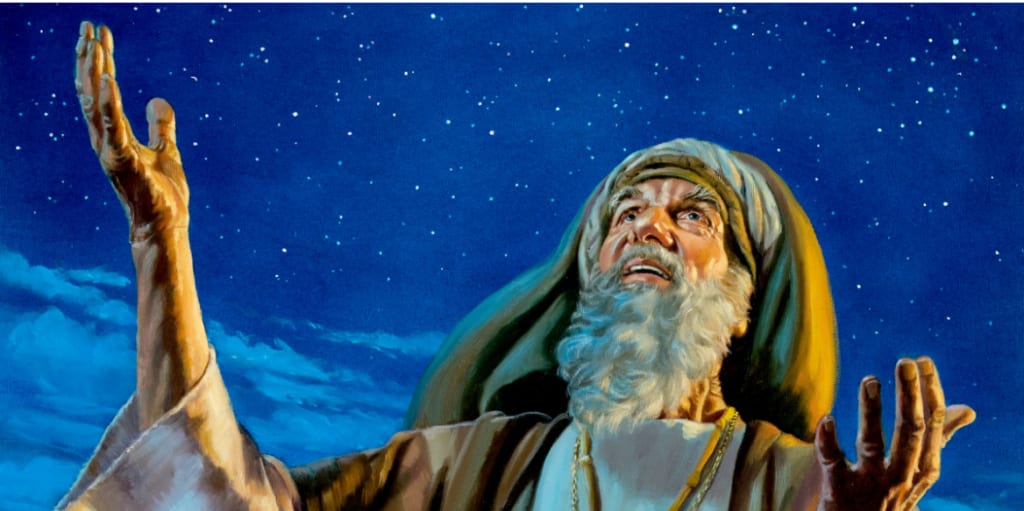Friend of God (Abraham)
Father of the nations

Friend of God : Abraham write an essay more than 1000 word
Abraham is a significant figure in the Abrahamic religions - Judaism, Christianity, and Islam. Known as the "Friend of God," Abraham is revered for his faith and obedience to God. He is considered the father of the Hebrew people and the first of the patriarchs. In this essay, I will discuss Abraham's life, his relationship with God, and his significance in religious and cultural contexts.
Abraham, also known as Abram, is considered the father of the nations in many religious and cultural contexts. He is known as the father of the Jewish people in Judaism, the father of the Christian faith in Christianity, and the father of the Arab people in Islam. In this essay, I will explore the reasons why Abraham is considered the father of the nations and his significance in religious and cultural contexts.
Abraham's story begins in the city of Ur, in present-day Iraq, around 2000 BCE. According to Jewish tradition, God revealed himself to Abraham when he was seventy-five years old and commanded him to leave his home and family to travel to the land of Canaan, which God promised to give to him and his descendants. Abraham obeyed God's command and set out on a journey with his wife, Sarah, and his nephew, Lot.
Throughout his journey, Abraham faced numerous challenges, including famine, war, and the loss of his wife's fertility. However, he remained steadfast in his belief that God would fulfill his promises. Abraham's faith and obedience to God were rewarded when God promised him that he would be the father of many nations.
In Judaism, Abraham is considered the father of the Jewish people. God promised Abraham that his descendants would be as numerous as the stars in the sky, and that they would inherit the land of Canaan. Abraham's faithfulness and obedience to God were passed down through the generations, and his descendants became the Jewish people.
In Christianity, Abraham is considered the father of the faith. The New Testament describes Abraham as an example of faith and righteousness. In the book of Romans, the apostle Paul writes that Abraham was justified by faith, and that all who believe in God are counted as Abraham's descendants.
In Islam, Abraham is known as "Ibrahim" and is considered a prophet. According to Islamic tradition, Ibrahim was the father of the Arab people through his son, Ishmael. God commanded Ibrahim to build the Kaaba in Mecca, which is considered the holiest site in Islam.
Abraham's significance in religious and cultural contexts goes beyond his role as the father of the nations. His story is also a symbol of faith, obedience, and perseverance. Despite facing numerous challenges and difficulties, Abraham remained faithful to God and trusted in his promises. His story has been an inspiration to countless generations, and his legacy continues to influence people around the world.
Throughout his journey, Abraham demonstrated great faith in God. He faced numerous challenges, including famine, war, and the loss of his wife's fertility. However, he remained steadfast in his belief that God would fulfill his promises. He also demonstrated his obedience to God when he was commanded to sacrifice his son, Isaac. Although this was a difficult command to follow, Abraham trusted in God's plan and was ultimately rewarded for his faithfulness.
Abraham's relationship with God was one of the most important aspects of his life. He was known as the "Friend of God" because he had a personal and intimate relationship with God. This relationship was characterized by trust, faith, and obedience. Abraham was also known for his hospitality and generosity, which he believed were expressions of his faith in God.
Abraham's significance in religious and cultural contexts cannot be overstated. In Judaism, Abraham is considered the first of the patriarchs and the father of the Jewish people. He is revered for his faith and obedience to God and is an important figure in Jewish history and tradition. In Christianity, Abraham is seen as a model of faith and righteousness. He is also mentioned in the New Testament as an example of faith and obedience to God. In Islam, Abraham is known as "Ibrahim" and is considered a prophet. He is revered for his faith and submission to God and is an important figure in Islamic tradition.
In addition to his religious significance, Abraham has also had a significant impact on culture and society. His story has been the subject of numerous works of art, literature, and music. He has also been a symbol of hospitality, generosity, and faith in many cultures. The concept of the "Abrahamic religions" - Judaism, Christianity, and Islam - is based on the belief that these religions share a common heritage and a common faith in the God of Abraham.
Abraham's journey from Ur to Canaan was not just a physical journey, but also a spiritual one. It was a journey of faith and obedience to God. Throughout his life, Abraham remained faithful to God, even in the face of great challenges and difficulties. His faith and obedience are an example for all of us to follow. Abraham's legacy continues to inspire and influence people around the world, and his faithfulness to God remains an example for all to follow.
In conclusion, Abraham was a significant figure in the history of Judaism, Christianity, and Islam. He was known as the "Friend of God" for his personal and intimate relationship with God, which was characterized by trust, faith, and obedience. His life and story have had a significant impact on culture and society and have been the subject of numerous works of art, literature, and music. Abraham's legacy continues to inspire and influence people around the world, and his faithfulness to God remains an example for all to follow.





Comments
There are no comments for this story
Be the first to respond and start the conversation.